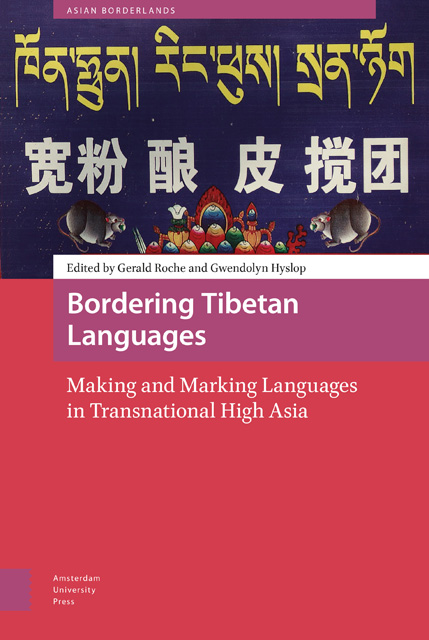Book contents
- Frontmatter
- Table of Contents
- Acknowledgements
- About the Cover Image
- 1 Introduction: Bordering Tibetan Languages: Making and Marking Languages in Transnational High Asia
- 2 Playing with Language Boundaries: Heteroglot Standard Language Ideology and Linguistic Belonging among Amdo Children
- 3 The Role of Classical Tibetan (Chöke) on the Development of Kurtöp, a Language of Bhutan
- 4 Reimagining Rongring without Tibetan Buddhist Influence
- 5 Glottonyms, Identity, and Language Recognition in the Eastern Tibetosphere
- 6 On the Yak Horns of a Dilemma: Diverging Standards in Diaspora Tibetan
- 7 Changing Identity and Linguistic Practices in Nubri: Veiled Language Endangerment in the Nepalese Tibetosphere
- 8 Borderline Dominance: Transnational Tibetan Language Politics in the Himalayas
- 9 Borders: In Conclusion
- Tibetan Language Summaries
- Asian Borderlands
- Index
8 - Borderline Dominance: Transnational Tibetan Language Politics in the Himalayas
Published online by Cambridge University Press: 24 November 2022
- Frontmatter
- Table of Contents
- Acknowledgements
- About the Cover Image
- 1 Introduction: Bordering Tibetan Languages: Making and Marking Languages in Transnational High Asia
- 2 Playing with Language Boundaries: Heteroglot Standard Language Ideology and Linguistic Belonging among Amdo Children
- 3 The Role of Classical Tibetan (Chöke) on the Development of Kurtöp, a Language of Bhutan
- 4 Reimagining Rongring without Tibetan Buddhist Influence
- 5 Glottonyms, Identity, and Language Recognition in the Eastern Tibetosphere
- 6 On the Yak Horns of a Dilemma: Diverging Standards in Diaspora Tibetan
- 7 Changing Identity and Linguistic Practices in Nubri: Veiled Language Endangerment in the Nepalese Tibetosphere
- 8 Borderline Dominance: Transnational Tibetan Language Politics in the Himalayas
- 9 Borders: In Conclusion
- Tibetan Language Summaries
- Asian Borderlands
- Index
Summary
Abstract
This chapter examines the politics of the Tibetan language in the People's Republic of China (PRC), Pakistan, Nepal, India, and Bhutan. It shows how a legacy of imperial borders, coupled with the indifference of contemporary states, has allowed Tibetans to exert linguistic dominance over smaller languages in the region. However, the dominance that Tibetans exert over other languages is borderline, insofar as it is tenuous and takes place in the context of the minoritization of Tibetan by the region's states. This borderline dominance nonetheless seriously impacts smaller languages of the region. Within the PRC, Tibetan is replacing several languages. In Pakistan, Nepal, India, and Bhutan, Tibetan serves as a scriptal model and hinders the autonomous development of smaller languages.
Keywords: Tibet, Himalayas, language politics, language oppression, borders, standpoint theory
Introduction: Ruination and duress in the Himalayan borderlands
The borders that Himalayan states today contest and defend are largely the legacy of an imperial world order that was ostensibly dismantled in the mid-twentieth century (Cribb & Li, 2004). The continued violence of these borders (Jones, 2017), and their ongoing capacity to wreak ruination on the living (Stoler, 2013) disproportionately impact the region's most vulnerable populations (Hughes, 2011; Gamble, 2019). This chapter examines how this violence against vulnerable populations manifests as domination and oppression in relation to languages. I argue that states achieve this violence, in part, by enlivening a political substrate below the hyper-visible surface activity of state policy and international relations (Davis et al., 2021), by animating and manipulating political projects carried out across state borders by non-state actors, and by drawing on narratives and legacies that tap into histories predating both state and empire.
I examine this phenomenon through an exploration of how Tibetans exert linguistic dominance over other populations throughout the transnational Himalayas. Tibetans may seem like an unlikely, and perhaps unimportant, political agent in a region characterized by the rising super-states of China and India: Tibetans are currently spread throughout the states of the region, fragmented into enclaves and islands, interned within the physical and political margins of states. In every country where Tibetans live today, they are a demographic and political minority, and their languages are subordinated and oppressed.
- Type
- Chapter
- Information
- Bordering Tibetan LanguagesMaking and Marking Languages in Transnational High Asia, pp. 175 - 196Publisher: Amsterdam University PressPrint publication year: 2022



